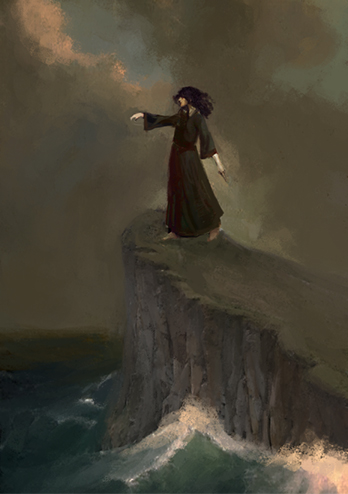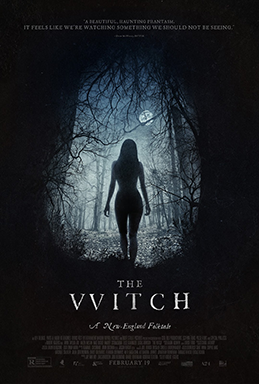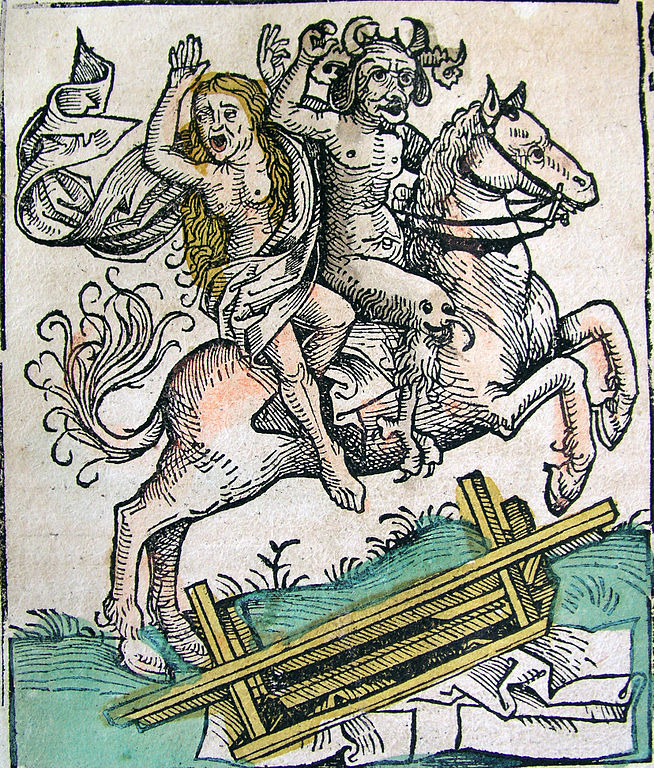Difference between revisions of "Witch"
Occultwiki (talk | contribs) |
Occultwiki (talk | contribs) |
||
| (3 intermediate revisions by the same user not shown) | |||
| Line 14: | Line 14: | ||
==History== | ==History== | ||
[[File:Devil-on-Horseback.jpg|350px|thumb|A witch riding on a horse with the Devil from the Nuremberg Chronicle]] | [[File:Devil-on-Horseback.jpg|350px|thumb|A witch riding on a horse with the Devil from the Nuremberg Chronicle]] | ||
The concept of witchcraft and the belief in its existence have persisted throughout recorded history. Most societies have believed in, and feared, an ability by some individuals to cause supernatural harm and misfortune to others. This may come from mankind's tendency "to want to assign occurrences of remarkable good or bad luck to agency, either human or superhuman". | The concept of [[witchcraft]] and the belief in its existence have persisted throughout recorded history. Most societies have believed in, and feared, an ability by some individuals to cause supernatural harm and misfortune to others. This may come from mankind's tendency "to want to assign occurrences of remarkable good or bad luck to agency, either human or superhuman". | ||
The predominant view of witches in the Western world derives from [[Bible|Old Testament]] laws against [[witchcraft]], and entered the mainstream when belief in witchcraft gained Church approval in the Early Modern Period. It is a theosophical conflict between good and evil, where witchcraft was generally evil and often associated with the [[The Devil|Devil]] and Devil worship. This culminated in deaths, torture and scapegoating (casting blame for misfortune), and many years of large scale witch-trials and [[witch-hunt]]s, especially in Protestant Europe, before largely ceasing during the European Age of Enlightenment. | Witchcraft is seen by historians and anthropologists as one ideology for explaining misfortune, which has manifested in diverse ways. Some cultures have feared witches much less than others, because they instead believed that strange misfortune was usually caused by gods, spirits, [[demon]]s or fairies, or by other humans who have unwittingly cast the "evil eye." | ||
The predominant view of witches in the Western world derives from [[Bible|Old Testament]] laws against [[witchcraft]], and entered the mainstream when belief in witchcraft gained Church approval in the Early Modern Period. It is a [[Theosophy|theosophical]] conflict between good and evil, where witchcraft was generally evil and often associated with the [[The Devil|Devil]] and Devil worship. This culminated in deaths, torture and scapegoating (casting blame for misfortune), and many years of large scale witch-trials and [[witch-hunt]]s, especially in Protestant Europe, before largely ceasing during the European Age of Enlightenment. | |||
[[Christianity|Christian]] views in the modern day are diverse and cover the gamut of views from intense belief and opposition (especially by Christian fundamentalists) to non-belief, and even approval in some churches. From the mid-20th century, witchcraft – sometimes called contemporary witchcraft to clearly distinguish it from older beliefs – became the name of a branch of modern Paganism. It is most notably practiced in the [[Wicca]]n and modern witchcraft traditions, and it is no longer practiced in secrecy. | [[Christianity|Christian]] views in the modern day are diverse and cover the gamut of views from intense belief and opposition (especially by Christian fundamentalists) to non-belief, and even approval in some churches. From the mid-20th century, witchcraft – sometimes called contemporary witchcraft to clearly distinguish it from older beliefs – became the name of a branch of modern Paganism. It is most notably practiced in the [[Wicca]]n and modern witchcraft traditions, and it is no longer practiced in secrecy. | ||
| Line 25: | Line 27: | ||
Hostile churchmen sometimes branded any magic-workers "witches" as a way of smearing them. Englishman [[Reginald Scot]], who sought to disprove witchcraft and magic, wrote in ''[[The Discoverie of Witchcraft]]'': "At this day it is indifferent to say in the English tongue, 'she is a witch' or 'she is a wise woman.'" | Hostile churchmen sometimes branded any magic-workers "witches" as a way of smearing them. Englishman [[Reginald Scot]], who sought to disprove witchcraft and magic, wrote in ''[[The Discoverie of Witchcraft]]'': "At this day it is indifferent to say in the English tongue, 'she is a witch' or 'she is a wise woman.'" | ||
Folk magicians throughout Europe were often viewed ambivalently by communities, and were considered as capable of harming as of healing, which could lead to their being accused as "witches" in the negative sense. Many English "witches" convicted of consorting with [[demon]]s may have been cunning folk whose supposed fairy [[familiar]]s had been demonised. | Folk magicians throughout Europe were often viewed ambivalently by communities, and were considered as capable of harming as of healing, which could lead to their being accused as "witches" in the negative sense. Many English "witches" convicted of consorting with [[demon]]s may have been cunning folk whose supposed [[fairy]] [[familiar]]s had been demonised. | ||
[[Sybil Leek]] regarded witchcraft as being passed down from the ancient Druids in an unbroken lineage. | [[Sybil Leek]] regarded witchcraft as being passed down from the ancient Druids in an unbroken lineage. | ||
| Line 42: | Line 44: | ||
* [[Witchcraft]] | * [[Witchcraft]] | ||
* [[Natural magic]] | * [[Natural magic]] | ||
* [[Witch of Endor]] | |||
[[Category:Witchcraft]] | [[Category:Witchcraft]] | ||
[[Category:Esoteric Vocations]] | [[Category:Esoteric Vocations]] | ||
[[Category:Featured Articles]] | [[Category:Featured Articles]] | ||
Latest revision as of 06:31, 25 November 2024

A witch is a practitioner of witchcraft.
Although the term can be gender-neutral, it is usually used to describe a female who uses magic, while a male engaging in similar practices is called a warlock.
Etymology
The word witch derives from the Old English nouns ƿiċċa [ˈwittʃɑ] and ƿiċċe [ˈwittʃe] ('sorceress, female witch'). The word's further origins in Proto-Germanic and Proto-Indo-European are unclear. The Old English verb wiccian has a cognate in Middle Low German wicken (attested from the 13th century, besides wichelen 'to bewitch').
Definition
Throughout history there has not been a consistent definition of the term witch. Johannes Nider and other 15th century writers used the Latin term maleficus to mean witch—a person who performed maleficium, harmful acts of sorcery, against others. The witch-hunts of medieval Europe differed from pre-Christian practices in condemning the witch as a moral corruption, rather than focusing on whether the act of sorcery was harmful, expanding the customary understanding of the maleficium concept.
Perhaps the earliest definition of a witch comes from Jean Bodin's 1580 book De la démonomanie des sorciers (Of the Demon-mania of the Sorcerers): "A witch is a person, who, though cognizant of the laws of god, endeavors to act through the medium of a pact with the devil." The introduction of the idea of demonic forces empowering the acts of maleficium gave the term witch new connotations of idolatry and apostasy that were adopted in the Malleus Maleficarum, but these remained disputed despite papal injunctions to take action against witches.
History
The concept of witchcraft and the belief in its existence have persisted throughout recorded history. Most societies have believed in, and feared, an ability by some individuals to cause supernatural harm and misfortune to others. This may come from mankind's tendency "to want to assign occurrences of remarkable good or bad luck to agency, either human or superhuman".
Witchcraft is seen by historians and anthropologists as one ideology for explaining misfortune, which has manifested in diverse ways. Some cultures have feared witches much less than others, because they instead believed that strange misfortune was usually caused by gods, spirits, demons or fairies, or by other humans who have unwittingly cast the "evil eye."
The predominant view of witches in the Western world derives from Old Testament laws against witchcraft, and entered the mainstream when belief in witchcraft gained Church approval in the Early Modern Period. It is a theosophical conflict between good and evil, where witchcraft was generally evil and often associated with the Devil and Devil worship. This culminated in deaths, torture and scapegoating (casting blame for misfortune), and many years of large scale witch-trials and witch-hunts, especially in Protestant Europe, before largely ceasing during the European Age of Enlightenment.
Christian views in the modern day are diverse and cover the gamut of views from intense belief and opposition (especially by Christian fundamentalists) to non-belief, and even approval in some churches. From the mid-20th century, witchcraft – sometimes called contemporary witchcraft to clearly distinguish it from older beliefs – became the name of a branch of modern Paganism. It is most notably practiced in the Wiccan and modern witchcraft traditions, and it is no longer practiced in secrecy.
Witches in Britain and Europe
Traditionally, the terms "witch" and "witchcraft" had negative connotations. Most societies that have believed in harmful witchcraft or 'black' magic have also believed in helpful or 'white' magic. In these societies, practitioners of helpful magic provided services such as breaking the effects of witchcraft, healing, divination, finding lost or stolen goods, and love magic. In Britain they were commonly known as cunning folk or wise people. Alan McFarlane writes, "There were a number of interchangeable terms for these practitioners, 'white', 'good', or 'unbinding' witches, blessers, wizards, sorcerers, however 'cunning-man' and 'wise-man' were the most frequent". Ronald Hutton prefers the term "service magicians". Often these people were involved in identifying alleged witches.
Hostile churchmen sometimes branded any magic-workers "witches" as a way of smearing them. Englishman Reginald Scot, who sought to disprove witchcraft and magic, wrote in The Discoverie of Witchcraft: "At this day it is indifferent to say in the English tongue, 'she is a witch' or 'she is a wise woman.'"
Folk magicians throughout Europe were often viewed ambivalently by communities, and were considered as capable of harming as of healing, which could lead to their being accused as "witches" in the negative sense. Many English "witches" convicted of consorting with demons may have been cunning folk whose supposed fairy familiars had been demonised.
Sybil Leek regarded witchcraft as being passed down from the ancient Druids in an unbroken lineage.
In popular culture

From at least the time of the Renaissance, witches have been a popular topic for music, literature, and theater. In the modern era, many movies and television shows have been made about witches and witchcraft, often portraying them in a sympathetic light.
In the 1968 film Rosemary's Baby, a young housewife is raped by the Devil at the behest of her husband and a coven of evil witches through a sex ritual intended to bring about the birth of the Antichrist.
The 1996 film, The Craft tells the story of four outcast teenage girls at a Los Angeles high school who pursue witchcraft for their own gain and subsequently experience negative repercussions. This film heavily influenced the modern witchcraft movement by inspiring many young women to find empowerment through ritual magic and natural magic.
The 2015 film The Witch, set in 1630s New England, follows a Puritan family who encounter forces of evil in the woods beyond their farm in the form of a witch of the woods.
